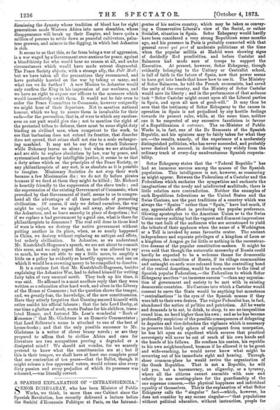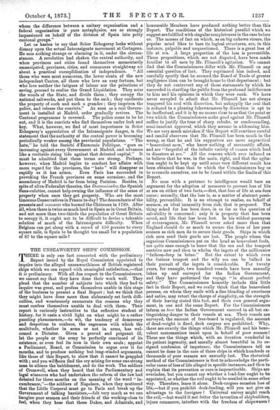A SPANISH EXPLANATION OF " INTRANSIGENCIA."
SENOR ECHEGARA.Y, who has been Minister of Public Works, we think, in more than one Cabinet since the Spanish Revolution, has recently delivered a lecture before the Socia6 d'Economie Politique at Paris, on the Intransi- gentes of his native country, which may be taken as convey- ing a Conservative Liberal's view of the Social, or rather Socialist, situation in Spain. Senor Echegaray would hardly have been considered a very strong Republican some months ago, and his presence in Paris is probably connected with that general sauve qui peat of moderate politicians at the time when the popular militia at Madrid were showing signs of decidedly Red proclivities, and before Castelar and Salmeron had made sure of troops to support the Executive. At present, however, Senor Echegaray, though evidently belonging to the Unitary or Centralist school, is full of faith in the future of Spain, now that power seems to have got into hands that know how to use it. The Ministry of Senor Salmeron, he told the French economists, had saved the unity of the country, and the Ministry of Senor Castelar would save its liberty ; and in the performance of that arduous task "Senor Castelar might count upon all the Liberal parties in Spain, and upon all men of good-will." It may thus be seen that the testimony of Senor Echegaray to the causes in operation in Spain is not prejudiced by any hostile feelings towards its present ruler, while, at the same time, neither can it be suspected of any excessive fanaticism in favour of a Republicanism a out rance. The ex-Minister of Public Works is, in fact, one of the Da Remusats of the Spanish Republic, and his opinions may be fairly taken for what they are,—the results, namely, of the experience of a moderately distinguished politician, who has never succeeded, and probably never desired to succeed, in deviating very widely from the ordinary track of every-day unadventurous Spanish respecta- bility.
Senor Echegaray states that the "Federal Republic" has had an immense success among the masses of the Spanish population. This intelligence is not, however, as reassuring as might appear. Between the Federalism of a Castelar and the Federalism which enchains the sympathies and enchants the imaginations of the needy and misdirected multitude, there is little relation save contradiction. Neither the examples of such Republican federations as the United States and the Swiss Cantons, nor the past traditions of a country which was always the " Spains " rather than "Spain," have had much, if any, appreciable effect in producing the popular preference. Glowing apostrophes to the American Union or to the Swiss Union convey nothing but the vaguest and dimmest impressions to the vast bulk of the audiences who are accustomed to yield the tribute of their applause when the name of a Washington or a Tell is invoked by some favourite orator. The ancient independence and separate privileges of a kingdom of Leon or a kingdom of Aragon go for little or nothing in the reconstruc- tive dreams of the popular constitution-makers. It might be even said that though the autocratic monarchy of Russia could hardly be expected to be a welcome theme for democratic eloquence, the condition of Russia, if its village communities and untaught ex-serfs were released from the controlling bond of the central despotism, would be much nearer to the ideal of Spanish popular Federalism,—the Federalism to which Senor Echegaray ascribes "an immense success "—than any organisa- tion of government and society to be met with in existing democratic countries. No Cantons into which a Castelar would consent to carve the State would be anything but monstrous "centralisations " in the eyes of the Spanish masses if they were left to their own desires. The vulgar Federalist has, in fact, abandoned the notion of politics and patriotism. All he wants and demands is to eat, to drink, to sleep, to see no inequalities round him, no head higher than his own ; and as he has become profoundly suspicious of the possible consequences of delegating to deputies and vice-defenders the vigilance which is necessary to preserve this lowly sphere of enjoyment from usurpation, he has hit upon an expedient which secures that practical sovereignty will never be out of reach of his own hands and the hands of his fellows. He confines his canton, his republic to his own neighbourhood, because if he allowed it to be great and wide-reaching, he would never know what might be occurring out of his immediate sight and hearing. Through sheer common-place he would revive the organisation of the Greek Republics. That is not a Republic, he will tell you, but a bureaucracy, an oligarchy, or a tyranny, where all the citizens cannot assemble with ease and celerity in one meeting-place for the guardianship of the one supreme concern,—the physical happiness and individual equality of themselves. This is the explanation of what Senor Echigaray calls the singular" fact—which, however, he does not consider by any means singttlar—" that populations without political education, without instruction, people for
whom the difference between a unitary organisation and a federal organisation is pure metaphysics, are so strongly impassioned on behalf of the division of Spain into petty cantonal groups."
Let us hasten to say that Senor Echegaray looks without dismay upon the actual Intransigente movement at Cartagena. He sees nothing strange or alarming in it, under the circum- stances. A revolution had shaken the central authority, and when provinces and cities found themselves momentarily emancipated, provinces, cities, and communes straightway set about a practical exemplification of independence. "All those who were most numerous, the lower strata of the new independent Canton, all those who love an easy fortune, but who love neither the fatigues of labour nor the privations of saving, proceed to realise the Grand Liquidation. They seize the woods of the State, and divide them ; they occupy the national saltworks, and put them to the sack ; they confiscate the property of such and such a grandee ; they imprison the police, and release the convicts." As soon as a real Govern- ment is installed at Madrid, order gradually revives. The Cantonal programme is reversed. The police come to be let out, and it is the convicts who find themselves under lock and key. What, however, we find of most importance in Senor Echegaray's appreciation of the Intransigente danger, is the statement that the authority of the central power is becoming periodically weaker among the provincial populations. "The hate," he told the Societe d'Economie Politique, "goes on increasing against every Government at Madrid, and advances like a veritable rising tide against that detested capital." It must be admitted that these terms are strong. Perhaps, however, when Madrid begins to conduct her affairs with more regard for the provinces, the " hate " will disappear as
rapidly as it has arisen. Even Paris has succeeded in provoking the French provinces on some occasions, and the ascendancy of Madrid is far from being Parisian. Besides, in spite of ultra-Federalist theories, the Descamisados, the Spanish Sans-culottes, cannot help owning the influence of the sense of property when once they get property. Who are the most timorous Conservatives in France to-day? The descendants of the peasants and manants who burned the Chateaux in 1789. After all, when there is twice as much land in Spain as in Great Britain, and not more than two-thirds the population of Great Britain to occupy it, it ought not to be difficult to devise a tolerable solution of much of the Intransigente difficulty. When Belgium can get along with a crowd of 450 persons to every square mile, is Spain to be thought too small for a population of 87 to the square mile ?



































 Previous page
Previous page